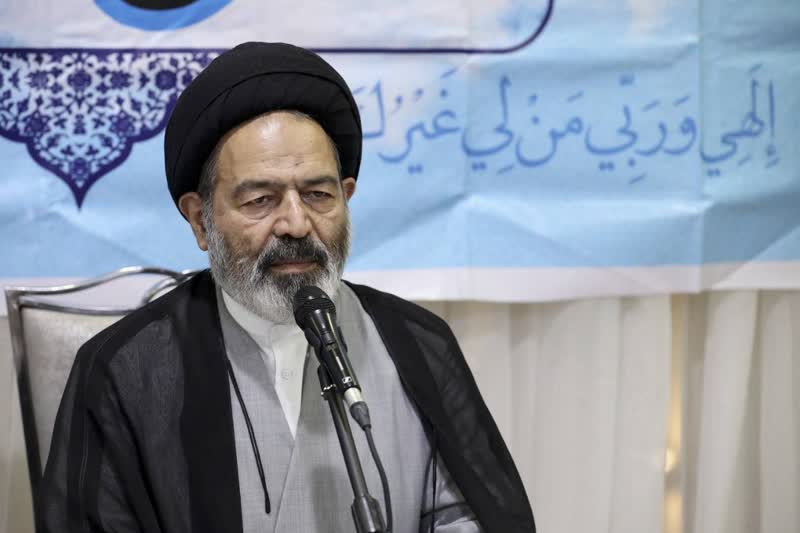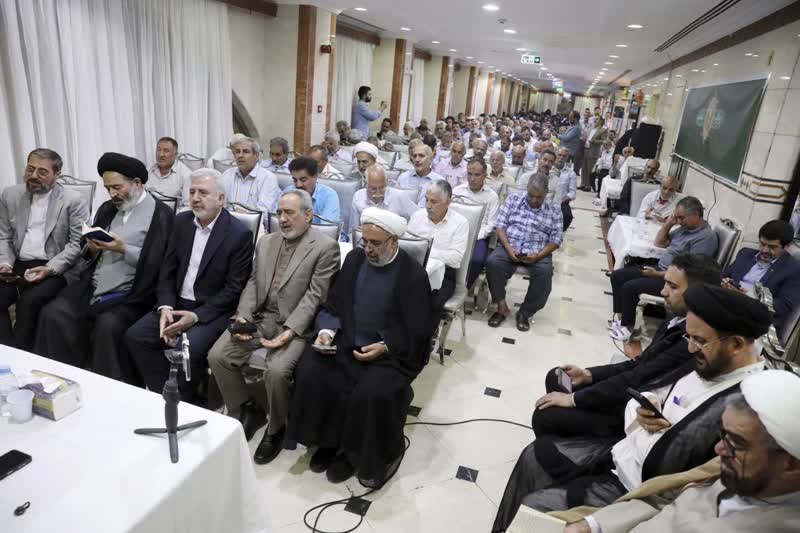Iranian Pilgrims Attend Komeil Prayers in Medina; Head of Iranian Pilgrims Explain Dignity Indicators
In the Komeil Prayer ceremony for Iranian pilgrims in Medina, the indicators of honor were explained from the perspective of the hadiths and narrations of the infallible Ahlul Bayt (AS), and the martyr Seyed Ibrahim Raisi was introduced as one of the symbols of service, honor, and honesty; a figure who gained honor through his dedication to the people and martyrdom.
Hojjat al-Islam Seyed Abdolfattah Navvab, the representative of the Supreme Leader in Hajj and pilgrimage affairs and the supervisor of Iranian pilgrims, attended one of the passionate, blessed, and spiritual rituals of the Komeil prayer ceremony for Iranian pilgrims in the hotels of Medina and delivered a speech.
At the beginning of his speech at the ceremony, which was attended by Alireza Bayat, Head of the Hajj and Pilgrimage Organization, Alireza Enayati, Ambassador of the Islamic Republic of Iran to Saudi Arabia, and Hassan Zarnagar, Consul General of our country in Jeddah, and a group of directors and deputies of the Mission and the Hajj Organization Headquarters, thanked God for the success of being near the Holy Prophet's (PBUH) shrine and asked all pilgrims to Medina to appreciate this great opportunity and make the necessary spiritual use of all their time in this land of revelation.
Citing the tenth verse of Surah Fatir, the head of Iranian pilgrims stated: Honor and humiliation are concepts that have been emphasized a lot in the Holy Quran and these concepts have certain indicators.
"Although honor and humiliation are in the will of God, it is man who can influence the acquisition of honor or humiliation through his actions," he added.

In this regard, Hojjat al-Islam Navvab pointed to the historical example of Hurr ibn Yazid Riyahi and said: Hurr's return to Imam Hussein (AS) saved him from humiliation and earned him honor.
He listed the indicators of honor and pointed out: observing fairness, having courage, contentment in life, jihad in the way of God, striving for divine pleasure and avoiding worldliness, having piety, obeying God, knowledge and insight, and paying attention to ethics are among the factors that create honor that have been emphasized in the narrations of the Ahl al-Bayt (AS).
The representative of the Supreme Leader in Hajj and pilgrimage affairs continued to explain the concept of fairness and emphasized: By setting the example of the Prophet's (PBUH) character, "we must treat people fairly and make this approach the focus of our lives after returning from the Hajj trip".
He also considered one of the aspects of courage to be expressing and accepting mistakes and added: Truthfulness is the highest character and gives a person honor.
Hojjat al-Islam Navvab added: Ignoring contentment will lead to humiliation. Also, jihad in the way of God is honorable; as throughout the history of Islam, warriors achieved this characteristic through sacrifice and dedication.

Referring to the importance of renunciation of the world in honorability, the head of the Iranian Hajj pilgrimage stated: "Any person who becomes more dependent on the world will suffer humiliation, and disregarding worldly status and positions and renouncing the trappings of the world creates the basis for honor. Because a person should strive for divine pleasure and serving people, not for gaining fame and status."
He considered obedience to God and avoiding dependence on worldly powers to be a source of honor and added: Imam Khomeini (may God be pleased with him) and the Supreme Leader are clear examples of this characteristic, who have gained honor by completely obeying God.
The head of the Iranian pilgrims considered piety to be one of the most important indicators of dignity and, referring to the personality of Imam Ali (AS), said: Despite his presence in difficult scenes such as Uhud and the Trench and his acquisition of high ranks and awards from God, he always considered serving God to be the highest honor, and this is a sign of true greatness and dignity.
Recalling the anniversary of the martyrdom of Martyr Raisi and the martyrs of service, he stated: Martyr Raisi and his companions, by dedicating themselves to the people and serving sincerely, acted based on the indicators of dignity and became beloved, and ultimately achieved a high position with their glorious martyrdom and burial next to Imam Reza (AS).
Hojjat al-Islam Navvab continued by referring to the behavior of Hazrat Yusuf (PBUH) with his brothers, and noted: The moral treatment of Hazrat Yusuf (PBUH) made him dignified, and his brothers acted the opposite of him and were humiliated.
In conclusion, he urged the pilgrims to make the most of every moment of their presence in Medina and to pray for the success and health of their compatriots.















